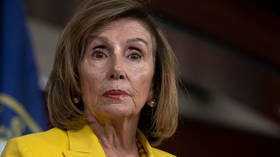Pelosi’s possible Taiwan visit will not lead to war – yet

Speaker of the US House of Representatives Nancy Pelosi appears to be on the verge of a trip to Taiwan, an event which China has vowed to respond to with “forceful measures.” The visit is a rehash of one she originally intended to undertake in April, but was prevented from doing so when she tested positive for Covid-19. Should it go ahead, it would constitute the first visit by a US house speaker to the island in 25 years. The last one was Republican Newt Gingrich, but the critical difference was that he did so as an opposition politician to then-President Bill Clinton, a Democrat.
This time around, Pelosi, as part of the majority party, is reportedly leading a delegation on an Asian tour at a time of unprecedented tensions. The trip also coincides with the anniversary of the founding of China’s People’s Liberation Army (PLA), which falls on August 1. Although President Joe Biden, as well as the US military, have voiced objections to the venture, this does not seem to have deterred Pelosi as of yet, with Republican hardliners now cheering her on and saying that the US will appear weak if she backs down.
This creates an extremely unfortunate dilemma, especially considering a Thursday phone call between Biden and Chinese President Xi Jinping, in which Xi warned Washington not to “play with fire” regarding Taiwan. But in reality, such talk has rarely meant anything given the US has, when it comes to serious actions, never been truly willing to de-escalate tensions with China, act pragmatically, or with common sense. While it is true that Pelosi is technically not the administration and would not be going there on their behalf, nonetheless, the fact this event is happening signifies how unhinged the broader spectrum of US foreign policy has become. There is no restraint whatsoever or respect for the red lines of other countries, only the push for maximalist aims at all costs.
Many people thought former President Donald Trump was insane and chaotic, yet an unspoken truth is that American foreign policy has actually regressed further under Biden. While Trump pursued narrow self-interests in the name of ‘America first’, which offended friends and foes alike, the Biden administration has not only embraced this doctrine, but refined it into an ideological crusade which strives to force American hegemony on every single front in a way that is both zealous and uncompromising. We should not be dismissive of Trump’s remarks that, if he were president, the conflict in Ukraine would not be happening right now, and he probably would have cut a deal to prevent it.
As a result, the US has continued to deride and press against China’s red line on the Taiwan issue, while at the same time officially claiming at the presidential level its policy remains the same to reassure China. This is a strategy that has been described as ‘Salami Slicing’ by Beijing, which endeavours to gradually shift the status quo towards Taiwan independence, while claiming not to do so to avoid strategic upsets that can create conflict. It is provocative, yet subtle. However, what Biden has not accounted for is the fact that Congress has even less restraint than he does. The onslaught of propaganda concerning US support for Ukraine has made many overconfident in the belief that China has been made to ‘think twice’ over Taiwan, and as a result, ultra-hawks, especially in Congress, are now happy to push this button further in believing they can call Beijing’s bluff.
But if this visit happens, will it lead to war? This might be an overreaction for many obvious reasons. China will not invade Taiwan should Nancy Pelosi visit. However, such a situation nonetheless forces Beijing into a corner to retaliate in a way which re-legitimizes its claim over the island and prevents political humiliation. If their bluff is called, their red line loses credibility, and the logic of deterrence means something has to be done to re-establish equilibrium. Therefore, when promising countermeasures, China means what it says. However, it remains unclear to what extent exactly Beijing will go to address this.
One thing that is obvious, looking at Taiwan Strait crises in the past, is that China will probably pursue large scale military exercises of some sort. The US is already responding to this by moving military assets into the area. However, there is also speculation Beijing may move further by declaring a ‘no-fly zone’ over the island or making a similar move which dramatically heightens the risk of confrontation. Remember, when Mike Pompeo sent UN Ambassador Kelly Craft to visit Taiwan on their last week in office, the flight was cancelled at the last moment after warnings from Beijing. This time around, China will undoubtedly react somehow, yet Pelosi and her supporters seem to think they can ridicule this, just like it was believed Russia’s red line over Ukraine could similarly be ignored.
Ultimately, this only goes to show that US foreign policy has degenerated into a form of strategic insanity. Fearing a loss of status over rival states, the country’s political class has become increasingly reckless and destructive in the moves it is willing to make to retain its hegemony. Even if this Pelosi visit does not result in open conflict, which it likely won’t, the damage it will do to strategic trust as a whole will likely be permanent, and could set the stage for conflict further down the line, something many voices in Washington seem to relish.
The statements, views and opinions expressed in this column are solely those of the author and do not necessarily represent those of RT.














